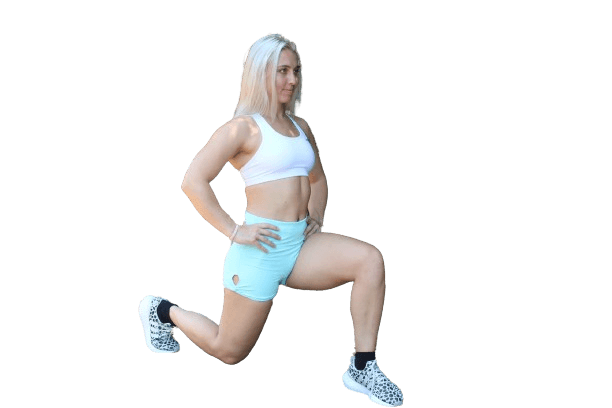Fitness
Prompt: Debunking Common Fitness Myths for Pregnancy and Postpartum
Jan 1, 2024
Congratulations! You're embarking on the incredible journey of motherhood. It's a time filled with joy, anticipation, and maybe a touch of trepidation, especially when it comes to your changing body. Fitness during pregnancy and postpartum is a topic shrouded in myths and misinformation. Can you exercise safely? Will it harm the baby? How do you get back into shape after childbirth?
This blog post is here to debunk those myths and empower you to make informed decisions about your health and well-being throughout motherhood. We'll explore some of the most common misconceptions surrounding exercise during pregnancy and postpartum, and highlight the invaluable role a certified personal trainer can play in guiding you towards your fitness goals.
Myth Busters: Dispelling Common Fitness Concerns
Myth #1: Exercise is dangerous during pregnancy.
Reality: With your doctor's approval, regular exercise is safe and beneficial for most pregnant women. It offers a wealth of advantages, including:
Improved cardiovascular health: Exercise strengthens your heart and improves blood flow, delivering essential oxygen and nutrients to your baby.
Reduced back pain: Pregnancy places significant strain on your back. Strengthening core muscles through exercise helps maintain proper posture and alleviate back pain.
Increased energy levels: Exercise combats fatigue, a common pregnancy complaint, leaving you feeling more energized throughout the day.
Improved mood: Physical activity is a natural mood booster, releasing endorphins that combat stress and anxiety.
Better sleep: Regular exercise can contribute to better sleep quality, a precious commodity for growing moms.
Myth #2: You can't exercise after a C-section.
Reality: While C-section recovery takes longer, gentle exercise like walking or modified yoga can be started soon after, with your doctor's clearance. Gradually increase intensity as your body heals. Exercise promotes circulation, reduces swelling, and aids in overall postpartum recovery.
Myth #3: Exercise will harm the baby.
Reality: In fact, the opposite is true! Exercise increases blood flow to the baby, delivering essential oxygen and nutrients for healthy development.
Myth #4: You have to lose all the baby weight immediately after birth.
Reality: Focus on gentle recovery and rebuilding strength in the first few months. Prioritize rest and allow your body time to heal. Weight loss will come naturally with a healthy diet and moderate exercise over time. Prioritize feeling good over aesthetics.
Myth #5: If you weren't active before pregnancy, you can't exercise now.
Reality: You can absolutely begin with gentle activities like walking or prenatal yoga. Consult a doctor or certified prenatal trainer to create a safe and effective program tailored to your fitness level, regardless of your pre-pregnancy routine.
Myth #6: Exercise has to be strenuous to be beneficial.
Reality: Even low-impact activities like walking or swimming provide significant benefits during pregnancy and postpartum. Focus on movement you enjoy and listen to your body. Every bit of movement counts!
The Power of a Personal Trainer: Your Partner in Prenatal and Postpartum Fitness
Now that we've debunked some common myths, let's explore how a certified personal trainer can be your partner in achieving your fitness goals throughout pregnancy and postpartum.
Here's a glimpse into the many ways a personal trainer can empower you:
Personalized Program Design: A trainer creates a customized exercise plan tailored to your specific needs, fitness level, and trimester (for pregnancy). They consider your individual health history, any limitations, and your desired outcomes.
Safe and Effective Exercises: A certified trainer has the knowledge and expertise to guide you through safe and effective exercises that target your core, improve posture, and promote overall well-being. They can also modify exercises as needed to accommodate changes in your body throughout pregnancy.
Motivation and Support: Pregnancy and postpartum can be emotionally challenging. A trainer provides ongoing motivation and encouragement, helping you stay accountable and committed to your fitness goals. They are your cheerleader and a source of support throughout your journey.
Pre and Postnatal Exercise Expertise: A certified prenatal or postpartum trainer has specialized knowledge of the unique physiological changes that occur during pregnancy and postpartum. They understand how to modify exercises and create programs that are safe and effective for each stage.
Injury Prevention and Guidance: A trainer can help you identify and avoid potential exercise-related injuries that can be more common during pregnancy and postpartum due to hormonal shifts and body changes.
Postpartum Recovery Focus: After childbirth, a trainer can design a program specifically focused on postpartum recovery. This may include exercises to strengthen your core, pelvic floor, and improve diastasis recti (separation of abdominal muscles).
Nutritional Guidance (in collaboration with a registered dietitian)
While a personal trainer can't provide specific dietary advice, they can work collaboratively with a registered dietitian to offer a well-rounded approach to your health and well-being. Here's how this collaboration benefits you:
Understanding Nutritional Needs: A trainer can assess your activity level and, in collaboration with a dietitian, recommend a personalized nutrition plan that fuels your body during pregnancy and postpartum. This plan will ensure you're getting the essential nutrients needed for both you and your baby (during pregnancy) or for breastfeeding (postpartum).
Healthy Eating Habits: They can guide you towards developing healthy eating habits that promote sustained energy and support your fitness goals.
Finding the Right Personal Trainer: Your Ideal Fitness Partner
Finding the right personal trainer is crucial for a successful and enjoyable experience. Here are some key factors to consider:
Certifications: Look for a trainer certified in pre and postnatal exercise. Certifications like NASM or ACE with a prenatal and postnatal specialization are ideal.
Experience: Seek a trainer with experience working with pregnant and postpartum clients. They'll understand the unique challenges you face and be able to tailor workouts accordingly.
Communication Style: Choose a trainer who communicates effectively, listens attentively to your concerns, and prioritizes your comfort level. You should feel comfortable asking questions and expressing any limitations you may have.
Training Philosophy: Consider their approach to fitness. Do they focus on high-intensity workouts, or do they prioritize functional movement and body awareness? Choose a trainer whose philosophy aligns with your preferences and goals.
Virtual vs. In-Person Training: Consider your lifestyle and preferences. Many trainers offer virtual training sessions, allowing you to work out from the comfort of your home, especially convenient for busy moms.
Building a Strong Foundation: Sample Exercises for Pregnancy and Postpartum
Pregnancy:
Walking: An excellent low-impact exercise that improves cardiovascular health and reduces back pain. Start with short walks and gradually increase distance and duration as you progress.
Prenatal Yoga: Strengthens core muscles, improves flexibility, and promotes relaxation.
Swimming: A gentle, full-body workout that is easy on your joints. The water provides buoyancy, making it ideal for pregnancy.
Modified Strength Training: Light weightlifting or bodyweight exercises can strengthen major muscle groups, improving posture and overall stability. Focus on proper form and use lighter weights under a trainer's guidance.
Postpartum:
Pelvic Floor Exercises (Kegels): Crucial for strengthening the pelvic floor muscles, which can weaken after childbirth and lead to incontinence.
Diastasis Recti Exercises: Specific exercises can help close the separation of abdominal muscles that can occur during pregnancy.
Walking: A great way to ease back into exercise postpartum and gradually increase intensity as you recover.
Postnatal Yoga: Focuses on gentle stretching, core strengthening, and pelvic floor exercises to promote healing and regain strength.
Modified Cardio: Low-impact activities like stationary bike or elliptical training can improve cardiovascular health without putting too much stress on your body.
Remember: These are just examples. A certified personal trainer can create a customized program based on your individual needs and preferences.
Embrace the Journey: It's About Feeling Your Best, Not Perfection
Pregnancy and postpartum are unique journeys for every woman. Don't get discouraged if you can't stick to your routine every day. Listen to your body, prioritize rest, and celebrate your achievements, big or small. Working with a certified personal trainer can provide the guidance, support, and motivation you need to feel your best throughout motherhood. They can empower you to move your body safely and effectively, build strength and resilience, and embrace the incredible changes your body is going through.
Ready to take the first step? Contact me to get started today!
ARTICLES
Latest Content
Nutrition
Fueling Your Fitness Journey: A Guide to Pregnancy Nutrition for Exercise Enthusiasts
Feb 10, 2024






